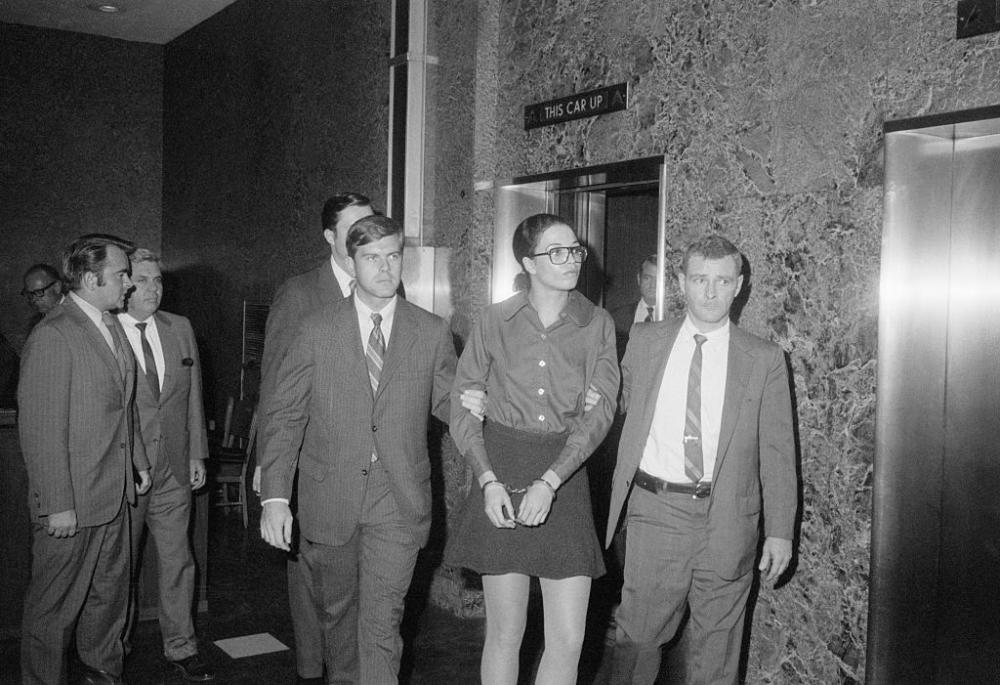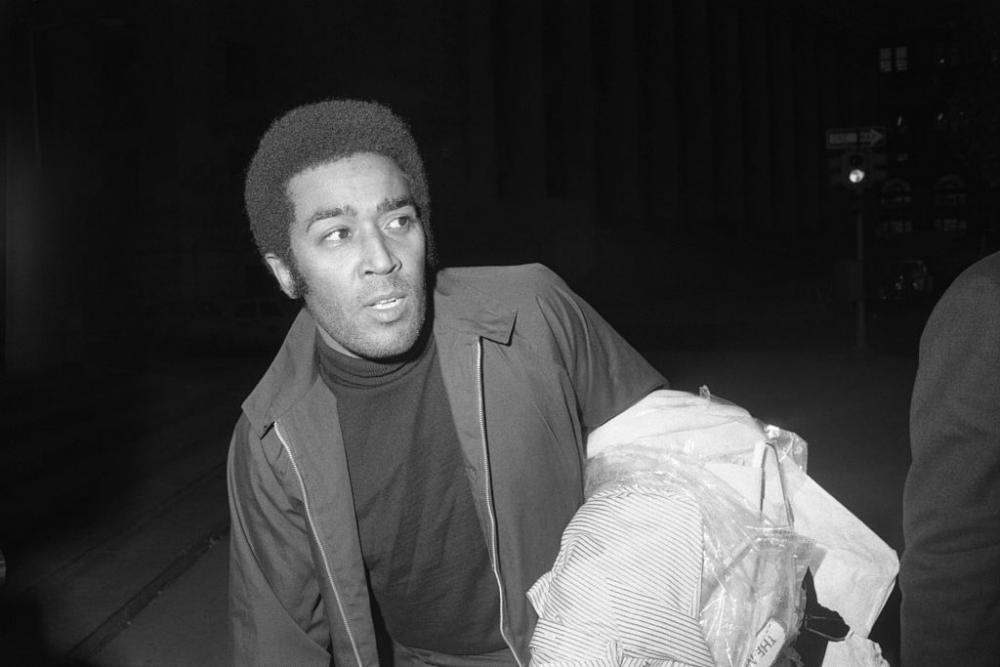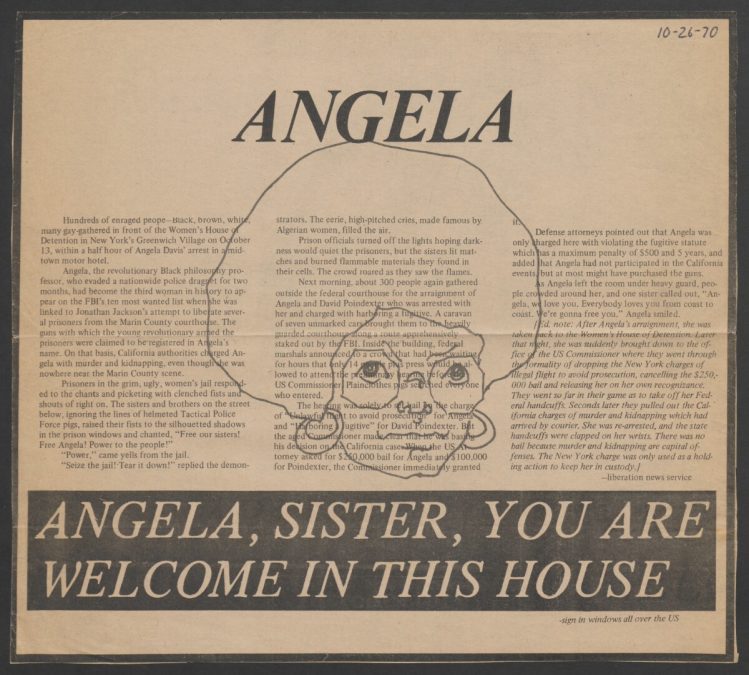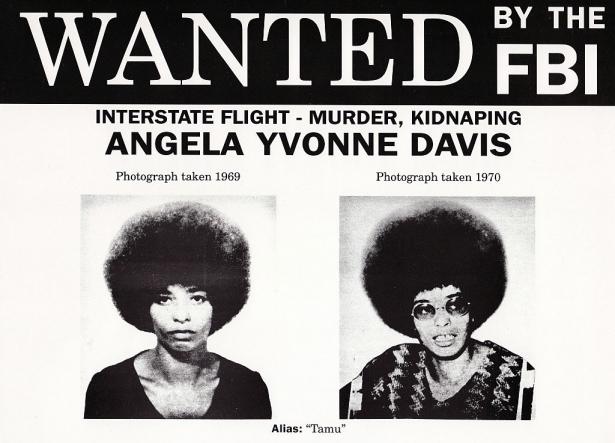It
was 1971 and, being young, single, a political activist, and a New Yorker, I wasn’t home much at my third-floor walkup in Greenwich Village except to sleep. One night in March, my across-the-hall neighbor poked her head out of her apartment to nervously tell me that “federal marshals” had been trying all day to find me.
I couldn’t think why the feds wanted to talk to me but figured it couldn’t be anything good. So, the next morning, I packed a couple of things and moved into Susan Sontag’s vacant apartment on the Upper West Side for a few days.
Susan and I had become close friends after being invited guests in Havana for the Cuban Revolution’s tenth anniversary celebrations in 1969. I had nowhere near her intellectual firepower — not many did — but I held my own with her in political debates, and she was amused, amazed, and intrigued that I was a real, live, actual US communist. What’s more, I was one with a sense of humor — even about the party — and with an anti-authoritarian bent. She lived part of the year in Paris, and I sometimes stayed in her apartment.
I was working (in a manner of speaking) at American Documentary Films — distributor and producer of a handful of antiwar, anti-racist, and pro-environmental films to churches, schools, and universities — which was walking distance from her place.
A day or two after my neighbor’s warning, I was walking down West End Avenue to work from Susan’s apartment. At 88th Street, a car cut me off. Two men emerged to hand me a subpoena. Turns out I was to be a prosecution witness in the trial of United States v. David Poindexter. David was a friend, and the man who was arrested at the Times Square Howard Johnson Hotel with Angela Davis, whom he’d accompanied on her flight from the authorities in California.
Meeting Angela Davis
Ifirst met Angela in 1962. She was eighteen years old and had come north from Birmingham (known, after the Ku Klux Klan’s 1963 murder of four black girls attending Sunday school at the 16th Street Baptist Church, as “Bombingham”) to study, first at Elizabeth Irwin High School in Greenwich Village and then Brandeis University. She and a childhood friend, Harriet Jackson, had applied and were accepted to be part of the 450-member US contingent at the World Youth Festival in Helsinki that year. I was the organizer of the US contingent, with an office on lower Park Avenue. Jim Jackson, Harriet’s father and a leader of the Communist Party, came by the office and encouraged me to look after his daughter and her friend Angela.
Seven years later, on that trip to Havana where Susan and I met, the Cubans asked me to organize a group of young Communists to visit Cuba, tour the island, and perhaps to work for a week or so in the sugarcane fields to understand the lives of ordinary Cubans under the revolution. The Cubans and I understood that this would be an “unofficial” delegation, not a Communist Party delegation, since I would be selecting the members, not the party. At the time, the Cuban and US parties were barely on speaking terms.

Bettmann Collection // Jacobin
I first met David Poindexter in New York around the same time. We met through Charlene Mitchell, a lifelong friend of David’s from their Chicago youth. Charlene moved to Los Angeles as a young woman and became a Communist Party leader there; and later came to New York to head up its Black Liberation Commission. Because of her Party work, Charlene helped direct the Che-Lumumba Club — which, fortuitously, was headed by Franklin Alexander, Charlene’s brother and a good friend of mine from my own California days.
These became the central actors in the drama that followed a few years later, when Angela became the FBI’s “most wanted woman” in 1970, following Jonathan Jackson’s shoot-out at the Marin County Civic Center. Jonathan’s older brother, George Jackson, was a Black Panther Party leader and acclaimed writer in San Quentin prison, and close to Angela. Several of the guns Jonathan used in the botched attempt to free his brother, which involved the killing of a judge at the civic center, were legally registered and licensed to Angela, for whom Jonathan sometimes acted as security (her life being under constant threat following then-governor Ronald Reagan’s attacks on her).
Franklin and his wife, Kendra, were Angela’s closest confidants and comrades. Charlene was their leader. David was the knight in shining (though disguised) armor, and I was a good friend with a close-up view of their doings.
Angela’s tenure at UCLA had been cut short when Governor Reagan denounced her Communist Party membership and demanded the university regents fire her. She was all of twenty-five years old. Given the governor’s hatred of her and the all-out federal war against the Panthers and their supporters, Angela quite rationally fled California with David Poindexter accompanying her. David, who was not a Party member and was not really all that political, risked his own life to aid her.
Avoiding arrest for almost two months, Angela and David were finally apprehended at a hotel near Times Square in New York City. David was held pending trial in the Tombs, the Manhattan men’s house of detention. For a couple weeks, while fighting a not-unexpected losing battle against extradition to California, Angela was held in the Women’s House of Detention in Greenwich Village, walking distance from my apartment. I regularly walked by the dreary twelve-story, red-bricked prison, which had housed Ethel Rosenberg, Billie Holiday, Dorothy Day, and tens of thousands of New York’s poor, tired, and hungry women.

Bettmann Collection // Jacobin
Greenwich Village had long symbolized alienated American bohemia and traditionally served as a haven for refugees from stultifying middle-class life. But from the Women’s House of Detention, screams and shouts of the prisoners daily pierced the neighborhood’s complacency. Here and there, scattered on the sidewalk, were bits of paper — stuffed through prison bars and fallen below — bearing messages about prison conditions. Reports of lice, roaches, mice, and rats were common. With a diet lacking the barest nutritional essentials, an inmate would occasionally find a mouse tail mixed into her evening meal.
Angela would eventually pull together a brilliant team of criminal defense attorneys in California. In New York, ahead of her extradition, her lawyers were John Abt, chief counsel for the Communist Party, and Margaret Burnham, another of Angela’s childhood friends who would later become Massachusetts’ first African American female judge and a Northeastern University law professor.
Through John and Margaret, I was able to secure official visits with Angela in jail, both as a friend and to conduct interviews for Ramparts magazine. It was the custom for relatives and friends of inmates to begin lining up outside the prison a couple of hours before the gates opened. When those in line around me learned I was there to visit Angela, they asked that I convey their support for her. One middle-aged African American woman, a nurse, said, “We’ve got to get her out or, the way things are going, we’ll all be inside those bars.”
In the two months between her disappearance in California and arrest in New York, Angela’s whereabouts, thoughts, and plans were the subject of much speculation in the media and on the street. When she and David were finally seized, the speculation achieved galloping proportions. David, routinely described in the press as a “mystery man,” was indicted for harboring a criminal federal fugitive.

Rubenstein Library // Jacobin
While Angela remained incarcerated, David was released on $100,000 bail posted by his mom in Florida. In an interview, he told me, “Why am I a mystery man all of a sudden? The FBI has visited me for years and the Chicago police knew me well enough to watch me when presidents came to Chicago. . . . I just don’t know what criminal they are talking about my harboring. I wasn’t seen with [segregationist] senator [James] Eastland of Mississippi or a Pentagon general. Certainly, Angela is no criminal.”
He then discussed the period leading up to the arrest:
J. Edgar Hoover obviously decided to make an example of Angela and unleashed all the forces at his command. To have been stationary would have paralyzed our ability to function. It is not so easy to avoid arrest as some people say, particularly when your picture is on the cover of every magazine in the country, on national television daily, and so on. It must be remembered that we had no preconceived apparatus. The charges against Angela came like a bolt from the blue, so the responsive reaction had to be planned day to day. . . . The point is that Angela Davis is innocent; there was no premeditation so there couldn’t be a prior apparatus set up.
David continued,
Angela had been subject to a year of harassment, and at times physical intimidation. This is important to remember. Then the death of Jonathan Jackson was a deep personal loss. The period of so-called flight was a time put aside to muster strength for the fight ahead. Angela was not about to place herself in the hands of those who vowed to “get” her. It’s amazing how many quarterbacks we have since the arrest; there must be thousands who have offered hindsight “advice” as if they had themselves built up years of experience. People want to know why we were found at Howard Johnson’s. Well, we weren’t in the ghetto because the search was concentrated in ghettos all across the country. We know that hundreds of black women resembling Angela were picked up. . . . When Angela asked me to help her, I was damned happy to comply. And it must be pointed out that in fact we did evade the dragnet for two months.
These excerpts from conversations with David, which were printed in Ramparts in the introduction to my interview with Angela at the Women’s House of Detention, were what led the federal marshals to subpoena me to appear as a prosecution witness against David in his upcoming trial.
The single charge against David was of knowingly harboring a federal fugitive. There was no suggestion that he participated in the shooting at the Marin County courthouse. As Judge John Cannella said in his instructions to the jury at the end of the trial, “the very crux of this case” was whether David was aware of the federal warrants for Angela. “If you find that the defendant had knowledge only of the state charges, you must acquit him.”
David had never said to anyone that he was so aware. Nobody had ever overheard him saying so. He obviously knew that she was wanted by the California authorities. But this was a federal case against him, and the prosecution had to prove he had knowledge of a federal warrant. The one piece of evidence against him was my interview with him.
I was a prosecution witness, but I was never going to testify against David — that was as likely as President Nixon appointing me to his cabinet. It wasn’t gonna happen, but I didn’t know how it wasn’t gonna happen. I’ve never been someone who accommodates hostile commands or demands. If I’m told by someone that it’s time for me to leave the premises, my initial impulse is to look for the nearest chair to make myself comfortable.
But now I was going to face a federal prosecutor in open court, having sworn to tell the truth, the whole truth, and nothing but. This was cause for concern.
So I consulted individually with Charlene Mitchell of the Party’s Black Liberation Commission, who was now organizing the National United Committee to Free Angela Davis; John Abt, the Party’s chief counsel; and Mary Kaufman, another Party attorney who had served as a prosecutor at the Nuremberg trials of Nazi war criminals. I needed guidance: how do I avoid testifying against David?
Each of them said basically the same thing: I needed to take the stand and tell the truth. David knew what he was doing and what the consequences might be; no point in my also going to jail for contempt of court. I was disappointed to hear them say this. I wanted advice on how to defy the prosecution, not submit to it.
So I had to rely on my own lonesome middle finger to the government, and I had no idea how it would play out until I took the witness chair to be sworn in. I was to be the forty-fourth prosecution witness, the cherry on the frosted cake — or more aptly, the lock on David’s casket.
Up Against the Court
The forty-three witnesses who preceded me were FBI agents and federal marshals who searched for Angela and David, and the clerks at the motels they stayed in, car rental employees, and the like. Judge Canella, in his instructions to the jury at the end of my testimony, said that they could convict if they found there was sufficient circumstantial evidence of a “high probability” that David knew of a federal warrant for Angela. The prosecution’s extensive list of witnesses was to show this sufficient circumstantial evidence.
Prior to the judge’s instruction, Stanley Arkin, David’s attorney, in his final argument told the jury, “Not one witness said that David had knowledge of the warrant. They came up with zero, except for speculation.” Which was why the prosecution had been so intent on getting me onto the witness stand: mine was the one potential testimony that would not be speculation.
After being sworn in, I gave my profession as a journalist and, quite generously, “film executive.” (Of course, I was the furthest thing from, say, Louis B. Mayer. Like the rest of the American Documentary Films staff, I was being paid wages that would shame a monk.)
Then began a three-way minuet between the prosecutor, the judge, and me that seemed to stretch on forever. It went like this — direct from the court transcript — with myriad variations on essentially the same give-and-take:
MR DOYLE (THE PROSECUTOR): Now, do you recall at this time the statements that Mr Poindexter made to you in the course of [your] conversations?
WITNESS: Not really.
MR DOYLE: I show you Government Exhibit 91 [the Ramparts interview] and ask you if it refreshes your recollection as to statements made to you by David Poindexter . . . ?
WITNESS: No, it doesn’t.
After some back-and-forth objections by David’s attorney, denied by the judge,
THE COURT: Read the question to the witness again. He apparently is still thinking or doing something. I don’t know what.
WITNESS: Thinking.
THE COURT: You are thinking. All right.
The question about my recollections is read to me.
WITNESS: It is really very difficult for me to answer that. I really don’t recall — I don’t have an independent recollection.
THE COURT: Listen, you are a man that deals with language, you write, you are a journalist. Now, when you are asked a question here, listen to the question and answer the question yes, it does, no, it doesn’t, or I don’t know.
WITNESS: I don’t know is the answer to that.
THE COURT: Just a minute, wait until you get the question and then you can answer it.
The question is read.
WITNESS: I don’t know.
At one point, the questions turned to whether and when I took notes in my conversations with David.
WITNESS: I am really embarrassed, but I really don’t know.
THE COURT: When you write something don’t you attempt to put down for the public’s edification what you yourself believe to be the facts as you know them?
WITNESS: I am very embarrassed.
THE COURT: You can be embarrassed as you want, but will you answer that question, or are you telling this jury that you write down something when you don’t know anything and you are not sure it is true or not?
WITNESS: I do that sometimes.
THE COURT: You do that sometimes?
WITNESS: Yes.
If I were a publisher sitting in the courtroom listening to my testimony, I’d have to be thinking, “What a schmuck. This guy thinks he’s a journalist? He’s a putz.” Of course, that was fine with me.
After more back-and-forth, then a sidebar conference of the prosecutor, defense counsel, and the judge, during which Mr Arkin said he was objecting “to continuing questioning this witness as to his recollection which has already been taxed.”
THE COURT: If that is a request and an objection, the objection is overruled and the request is denied.
MR DOYLE: When this story [was] on typewriter, Mr Myerson, at that very moment were you reducing to writing your best recollection of what the defendant Poindexter had told you when you had spoken to him?
WITNESS: [The] story was done in a great hurry partially by telephone with the San Francisco office and I don’t recall—
THE COURT: Just a minute. Strike it all out. I suggest to you that instead of you explaining why you can or can’t answer a question, either answer the question that it is so or it isn’t so or you don’t know. Read the question to him and we will get an answer to it.
The question is read.
WITNESS: I don’t know.
In the witness chair, I was essentially sitting right next to the judge. But sensing the frustration in his voice, I didn’t look at him. I focused my attention on the prosecutor. He had been given this slam-dunk assignment — after all, David had been arrested together with Angela, their photos were on front pages around the world — and he’s now questioning this fool who was essentially telling the world that he’s the most inept, if not unscrupulous, journalist in the country. He looked like he would rather throttle me than interrogate me.
Then came the following exchange.
MR DOYLE: Now, as a journalist, what is your normal practice with respect to writing articles? Do you normally endeavor to the best of your ability to reduce to writing or do you actually remember what you were told as a journalist?
WITNESS: It depends on the kind of story.
MR DOYLE: Do you normally write a truthful account of your best recollection of what you were told as a journalist; is that your normal practice?
WITNESS: That also depends on the story.
The prosecutor couldn’t have appeared more flummoxed had I peed on his foot. And the judge was becoming more agitated.
MR DOYLE: Were you attempting to put to writing an untruthful account of what you were told by Mr Poindexter? . . .
THE COURT: He has already answered that and I don’t think that is going to help us because I think his answer is going to be the same, so I see no reason in having him answer the same.
I am a little closer to him and I can hear him a little better than you. I don’t know essentially what I am hearing, but I am closer to him.
Would you step to the side bar a minute, both lawyers, because this waltzing could go on forever.
In the sidebar, Mr Arkin asks for a declaration of mistrial because of “Your Honor’s comments that you don’t know what you’re hearing.” To which the judge replied, “All right, that is good and the motion is denied.”
The judge then asked the prosecutor to show me the Ramparts article itself and essentially took over the questioning from the prosecutor.
MR DOYLE: Did you write the words that are indicated in brackets there, sir?
WITNESS: I really don’t recall. I can’t say for sure.
THE COURT: Is that your article?
WITNESS: Yes.
THE COURT: Is it over by your by-line?
WITNESS: Yes.
THE COURT: And you are telling us now that you don’t know whether that belongs to the article which you submitted, is that what you are saying?
WITNESS: It is in the article, but I don’t know if I wrote it.
THE COURT: Is it your by-line?
WITNESS: I tried to explain earlier, sir, that part of it was written in the San Francisco office by the editors.
THE COURT: And they use your by-line.
WITNESS: It is a very frequent practice, common practice.
THE COURT: But you stand behind your by-line, don’t you?
WITNESS: It is over my name.
THE COURT: What is the sense of putting your by-line on it if it doesn’t concern you and concerns somebody in the San Francisco office, can you tell me that?
WITNESS: That is a problem we writers have with editors all the time.
After several more minutes of this, the prosecutor tried to get a word in but the judge quieted him.
THE COURT: He has stated from the beginning that he can’t pinpoint this because he doesn’t know what was told to him and what was told to the San Francisco people. Is that a fair statement of your testimony?
WITNESS: The first part, not the second part.
THE COURT: What do you mean the “first part”?
WITNESS: That I can’t pinpoint it.
THE COURT: Can you pinpoint any of this material?
WITNESS: You were accurate about that.
THE COURT: What was inaccurate about what I said?
WITNESS: I don’t know — I don’t remember with any kind of independent recollection what is accurate in there and what [of it is not] accurate. I don’t have any notes from that time.
By now the prosecutor is a confused bystander, and the judge is pissed. After a few more minutes of dumb and dumber, the prosecutor tried to get in a question.
THE COURT: He already said “No” to that.
MR DOYLE: I thought you wanted me to ask that question, your Honor.
THE COURT: Let’s get this clear: I don’t care what you and Mr Arkin ask. I only rule on the question. I couldn’t care less what you ask, so don’t be putting any direction at me. I am not directing anything.
The prosecution got the drift and said he had no further questions. David’s attorney said he had no cross-examination, and I was dismissed from the stand.
I had no idea what I was going to do or say when I first took the witness chair. My older brother had a very successful career directing, producing, and teaching improvisational theater. That afternoon might have made him proud.
I left the courthouse and went home to cook dinner and relax. Later that night, the phone rang. It was David. “That was great, man. We did it. It’s over and I’m free. Let’s get some drinks.”
[Michael Myerson is an author and lifelong activist for civil rights, peace, and labor rights. He lives in the Hudson Valley.]
OUR NEW ISSUE, “THE RULING CLASS,” IS OUT NOW. GET A $20 DISCOUNTED PRINT SUBSCRIPTION TODAY!


Spread the word